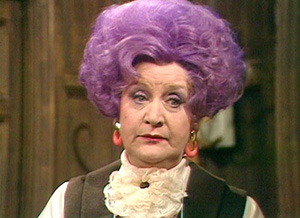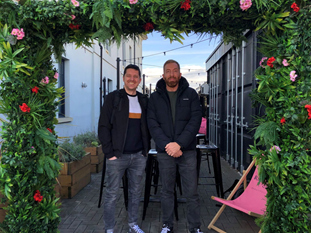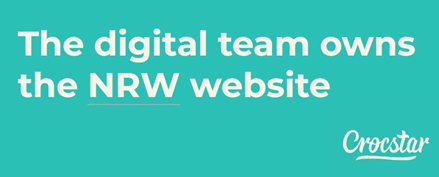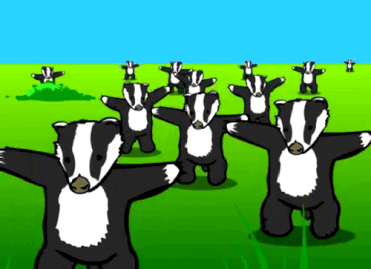Weeknotes 28/04/2023
This week Andrew and Phil are looking at the forms on our website, pair writing, trio writing and writing content for our users.
This makes a change from Andrew and Phil swapping jokes about Mrs Slocombe. In case you are too young to remember, Mrs Slocombe became famous for starring in a TV sitcom called “are you being served”.

Source: Wikipwedia
Well moving on…what’s been happening this week in the digital team?
Pair and trio writing
This week Phil met up with Rob from FourthWallContent. Rob’s been helping us to improve the woodlands and forests area of our website. Rob is really lovely to work with and certainly knows his stuff.
Sometimes the content designers in the digital team write content on their own and sometimes they pair write or even trio write.

Pair writing
Pair writing involves two people sitting down together and writing content in real-time. It really is as simple as that!
It might be simple, but it’s so effective. Instead of a single content designer sitting on their own trying to work out how best to describe something as complicated as an acid sensitive river catchment area, they work together to create user focussed content.
Two brains are always better than one. It helps having someone who can question what you write, the style that you write, and to keep the content on track and focussed. It also helps to have another detective on board to decipher the complicated stuff.
In fact Andrew and Phil have been pair writing on this piece of content, what an excellent job they have done.
Trio writing
Then there is trio writing, once the content designers have come up with a draft content page we share that draft text with the excellent translation team.
That’s how trio writing works. The two content designers from the pair writing session (Rob and Phil), then get together with the lovely Manon from the translation team to translate the content.
It’s done this way as not all words translate to Welsh very well or even at all. When we started the trio writing we had this sentence: Your land must not contain any sensitive areas.
We learnt that sensitive areas will not translate, it loses its meaning, so we had to come up with something else. After working with Manon we came up with: Your land must not be in a protected area.
We did this for the entire content page. Instead of translating the text as is word for word, we made sure both languages contained excellent bi-lingual content.
Writing clear user focussed content
Creating user focussed content is a process of writing good, clear content with the user in mind.
Publishing anything and everything is not the way to create good user focussed content. This approach leads to random information appearing on a webpage that no one cares about and that no one will even read. The very best we could hope for in this type of situation is for someone to at least skim read the random and complex information.
This week Phil got a good example of this behaviour. When I’m explaining to people about why we should write clear content, I often use the example of a driving licence:
We all know that to drive on our roads you must have a driving licence, to drive on our roads and not have a driving licence is breaking the law. Despite the fact we all know we need a driving licence, we don’t read the law or read tons of information each time we get into our cars.
Many colleagues seem to believe that our users need to read about the law and tons of information before applying for a licence or carrying out a task online.
An example of bad, random, and complex content
This is one example of how not to write user focussed content, this content is on our website:
What is meant by development?
Section 55 (1) of the Town and Country Planning Act 1990 (“the 1990 Act”) defines ‘development’ as:
“…the carrying out of building, engineering, mining or other operations in, on, over or under land, or the making of any material change in the use of any buildings or other land.”
In addition, no fee shall apply to an application for a licence necessary to implement a development (whether or not it is also a householder development) that the relevant local planning authority have accepted as coming under the exception in Regulation 4 of The Town and Country Planning (Fees for Applications, Deemed Applications and Site Visits) (Wales) Regulations 2015 in that the authority is satisfied that it relates solely to explicit powers to charge a reasonable sum for these licences in Paragraph 57.5 of the 2017 Regulations, section 16.5 of the Wildlife & Countryside Act 1981 and Article 12A of the Functions Order 2013.
Please note that this list is not exhaustive.
Good clear user focussed content
The ‘what is meant by development?’ text is therefore not very clear for the user. It’s not clear if you need a licence or not, it’s not clear what the licence is for. The text also talks about charging, but what are the costs?
The lovely content designers in the digital team try their very best to publish good clear user focussed content.
If Phil had half a chance to create good clear content, the ‘what is meant by development?’ text would read:
Apply for a development licence.
It is against the law to:
- deliberately capture, injure, or kill wildlife
- damage or destroy breeding or resting places of wildlife
- transport, sell or exchange live wildlife
We charge £133 for licences if you are carrying out any local or major developments.
We will not charge for licences if you are carrying out:
- household developments
- property maintenance not requiring planning consent
- a development which provides access and facilities for disabled people
The conclusion to my ramblings
Writing good clear content helps the users instantly know what they need to do to complete a task.
They don’t have to struggle, they don’t have to call us because they don’t have a clue what we are talking about. They don’t have to wade through or decipher tons of regulations or information before they find out that to capture, injure, or kill wildlife is against the law.
Having bad, complex content could be disastrous for the poor wildlife. The user could not understand the content, or the user could just ignore the complex information about the law. They could end up not applying for a licence, leading to the destruction of the wildlife or its habitat.

The work we’ve done over the last year, summarised in the Content handbook, sets out that we are actually empowered and responsible for decisions on the website - but day to day, it doesn’t feel like that.
NRW forms - the digital evolution continues
Phil and Andrew have been as busy as springtime badgers getting their setts ready for new cubs.
Instead of replacing the old bedding for new and digging new chambers, they have been replacing many of the old hard copy species licence forms and making them into new, online versions and content.
They hit a bit of a stump when it came to translating these forms as they were sent in the original hard copy Microsoft Word format, making it difficult to see the amends made in the new digital format.
We worked with the translation team and the species team (who were really struggling updating different versions in Word). We agreed that any future amends made to these forms were in a digital format as opposed to the old, outgoing hard copy versions.
This solution really helped the digital and species team and will further support the translation team to locate any changes on the Welsh and English parts of the forms.
A win/win for all and, best of all, no badgers were harmed in making the digital forms for our new pages.

Source: Wikipwedia
Census online
This week was part two of learning all about the census online. A few of the team have attended these online talks and found them very interesting.
In 2021, the UK government conducted the census online and the approach offered various benefits, including improved data quality, ease of completion for the user, faster processing of data and reduced costs and environmental impact.
The aims of an online-first census approach were to:
- improve data quality
- ease respondent burden
- enable responses to be processed faster
- reduce costs and environmental impact
The webinars, led weekly by the CDPS and ONS, offer valuable insight for our team in improving our services as we move traditionally paper form processes, such as permitting, onto online forms, for all the benefits listed above.
The increased functionality and the ability to focus on smaller areas to investigate drop in response rates, allows for the identification of issues so that the ONS team could resolve it quicker.
The flexibility and accessibility incorporated into the design resulted in a positive outcome, allowing for the response rate of this online-first census to exceed the targets set.
Other things we’ve been working on:
- Laura has attended the overview of our digital services session. She is continuing to be fabulous and is doing some excellent work
- Heledd, James and Sam have been meeting with Mima to discuss NRW’s list of services
- James has held two user interviews about our new ‘Woodlands and forests’ landing page
- Laura and Lucinda gave a ‘Teams’ presentation to 44 NRW colleagues on our updated web content and publishing manual - there were lots of interesting questions which Shaun stepped in and answered demonstrating teamwork at its best
- Sophie and Kim have been working through online forms and considering new, simplified pathways to lead users to the right service for their needs.
- Sophie also attended week one of a content design course, to better understand how we can improve our users’ journeys through the website by designing content that speaks to their understanding, and not just our organisations
- The Digital Team has been sharing ideas to streamline our working process, and putting the ideas into action by creating a new content bucket to store upcoming tasks. This means our team is aware of upcoming deadlines and allows teams from within the organisation to contact us earlier with their requests, ensuring deadlines are met promptly. When sending in internal requests to our team, please use the content request form and detail any updates, new content or changes you would like, including attaching any documents, the URL you’d like us to work on and the deadline of this task. We encourage people not to ‘request ASAP’ as this makes planning out our workload and allocating tasks fairly amongst our team more difficult. If you do not have a specific deadline in mind, please say this and suggest an estimated date of completion, and we will work to complete your request within the estimated time frame
- Shaun is working on a number of web-pages for intensive farming environmental permit holders.